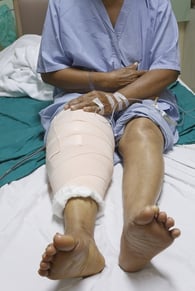 If you are considering joint replacement surgery, knowing exactly what you're getting into is essential to making a well-informed decision about whether or not this surgery is right for you. Should you decide to move forward with surgery, knowing what to expect from the procedure, as well as the recovery and rehabilitation period, is very important to ensure you're prepared to make solid decisions about your care throughout the process. In the interest of helping you learn what you need to know to make these decisions with confidence, let's go over the basic facts on joint replacement procedures.
If you are considering joint replacement surgery, knowing exactly what you're getting into is essential to making a well-informed decision about whether or not this surgery is right for you. Should you decide to move forward with surgery, knowing what to expect from the procedure, as well as the recovery and rehabilitation period, is very important to ensure you're prepared to make solid decisions about your care throughout the process. In the interest of helping you learn what you need to know to make these decisions with confidence, let's go over the basic facts on joint replacement procedures.
About Joint Replacement Outcomes
Among the most important facts to be aware of as you make the initial decision on whether or not to have surgery is what you can expect in terms of results. Joint replacement procedures are, according to the American Academy of Orthopaedic Surgeons, among the most common and successful orthopaedic procedures performed today, with most patients – more than 90 percent – enjoying results that include substantially decreased pain and significant improvements in mobility that lead to healthier, more active lifestyles.
However, those results are not obtained overnight. Recovery and rehabilitation will take several months – even up to a year in some cases – and is a challenging process. That said, most patients who have had these procedures feel that the improved quality-of-life they experience after joint replacement is well worth the time and effort.
The Basic Facts on Joint Replacement Surgery
Joint replacement surgery removes a damaged or diseased joint and replaces it with an artificial joint. These devices may be made of metal, plastic, ceramic, or some combination of these materials, and the devices are designed to replicate the function of natural joints. The most common joints replaced are knees and hips, procedures that typically take about two hours to complete. While joint replacement is considered safe and effective, like any surgery, complications are possible. Most common are infection, blood clots, nerve injury, or implant problems like loosening or dislocation.
You can expect to spend up to four days in the hospital after surgery. For the vast majority of patients, the rehabilitation process begins almost immediately after surgery, with physical therapists making a bedside visit within 24 hours. That session will include range of motion exercise along with helping patients to a sitting position at the edge of the bed, then onto their feet to take a few steps with the assistance of a walker.
Hospital Discharge
Depending upon your recovery progress, you may be discharged to your home after your hospital stay, with instructions to attend outpatient rehabilitation appointments, or referred to an inpatient rehab program for a week or two, on average, for intensive rehabilitation therapy and care.
Generally, inpatient short term rehab programs are recommended for patients when their medical care team feels that they have not yet achieved a level of recovery and rehabilitation that will allow them to manage their own care safely at home, or when patients do not feel confident that they can do so. Additionally, many patients request inpatient rehab, since the intensive rehabilitation therapy and care these programs offer can promote a faster, more complete return to normal activity levels than can be achieved with outpatient therapy options.
Whether you start outpatient therapy immediately or after completing an inpatient rehab program, you can expect therapy to continue for at least three months after surgery. Most patients are walking independently within three to four weeks, and the majority are able to get back to most normal activities within six months.





